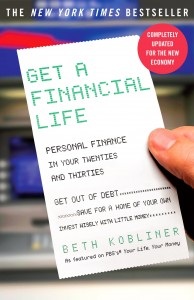 Suze Orman has pretty well locked up the top spot for go-to financial advice for women. She is not only a financial guru, she is an entrepreneur and executive, an author, the host of her own TV show, and, well, a brand. She makes me tired. She has also learned all her financial savvy in the trenches, first at Merrill Lynch, and later at Prudential Bache Securities and eventually, her own firm. (Her college degree is actually in social work, not finance.)
Suze Orman has pretty well locked up the top spot for go-to financial advice for women. She is not only a financial guru, she is an entrepreneur and executive, an author, the host of her own TV show, and, well, a brand. She makes me tired. She has also learned all her financial savvy in the trenches, first at Merrill Lynch, and later at Prudential Bache Securities and eventually, her own firm. (Her college degree is actually in social work, not finance.)
Suze Knows Best (Just Ask Her)
In her book, The Money Book for the Young, Fabulous & Broke, Orman sets out to show people who are well-educated and intelligent yet drowning in debt that they can learn some financial basics and get on the right financial road by dealing with the debt, learning about banking and investment, and working towards home ownership. It’s a sound plan.
As a finance professional, I have to say that I can’t recall ever hearing Suze Orman give bad advice. She certainly has a proven track record. Unfortunately, as I said, she makes me tired, and that’s as much about listening to her (or reading her) as it is reading her resumé. I always feel like she’s yelling at me. She’s the financial alpha, and you’d better not challenge her, or you’ll find yourself running home with your metaphorical tail between your legs. Maybe I’m contrary by nature, but when a pundit shouts at me that they’ve got the plan and I’d better follow it, I find I’m highly motivated to do something, in fact anything, else.
A Kinder, Gentler Way to Tell You Why You’re Broke
Beth Kobliner is a journalist who has worked for Money Magazine, among others. She also picked up her money smarts after school (her degree is in literature). She is a regular on the national public radio show, The Takeaway, and she serves as an advisor for Sesame Street’s financial education initiative. She even appears in a video with Elmo.
In her book, Get a Financial Life, Kobliner sets out to show people who are well-educated and intelligent yet drowning in debt that they can learn some financial basics and get on the right financial road by dealing with the debt, learning about banking and investment, and working towards home ownership. Sound familiar?
The thing that I like about Kobliner’s approach is that she assumes that if her readers were budding wheeler-dealers, they probably wouldn’t need her book. The first “chapter” is basically a cheat sheet, the book boiled down to basic ideas (you can read it in a few minutes). She understands that money stuff makes a lot of people’s eyes glaze over. After quickly explaining why paying off your credit cards is really worthwhile, she says, “If you want a full explanation of this concept, turn to p. 34. Otherwise take my word for it.” Kobliner seems to sit down with you over coffee and say, “Here’s something I think you ought to try.” It’s a much gentler approach. Think of Kobliner as a life coach to Suze Orman’s drill sergeant. I bet Suze Orman would have scared the pants off Elmo. Wait– does he wear pants?
Both books are bestsellers, and they’ll both give you the same basic advice: pay off your credit cards, set up a savings plan, start building equity instead of paying rent (all of which are easier said than done if you’ve gotten into bad financial habits–I say again, it’s exactly like your diet). Which book is likely to do you more good depends entirely on what kind of management style you prefer to work with. If you need somebody on your case, go with Suze Orman. If you want to feel like you’re talking to a friend, go with Beth Kobliner. But if you’ve gotten to the point where you’re just paying the interest charges on your credit card each month, it’s time to go with someone.
, she has helped me get out of debt. she spekas with a different kind of passion that i respect. her one goal is getting people out of debt and teaching us that we can’t have everything we want just because we can make payments. she looks at the bigger picture and makes what should be important a priority.